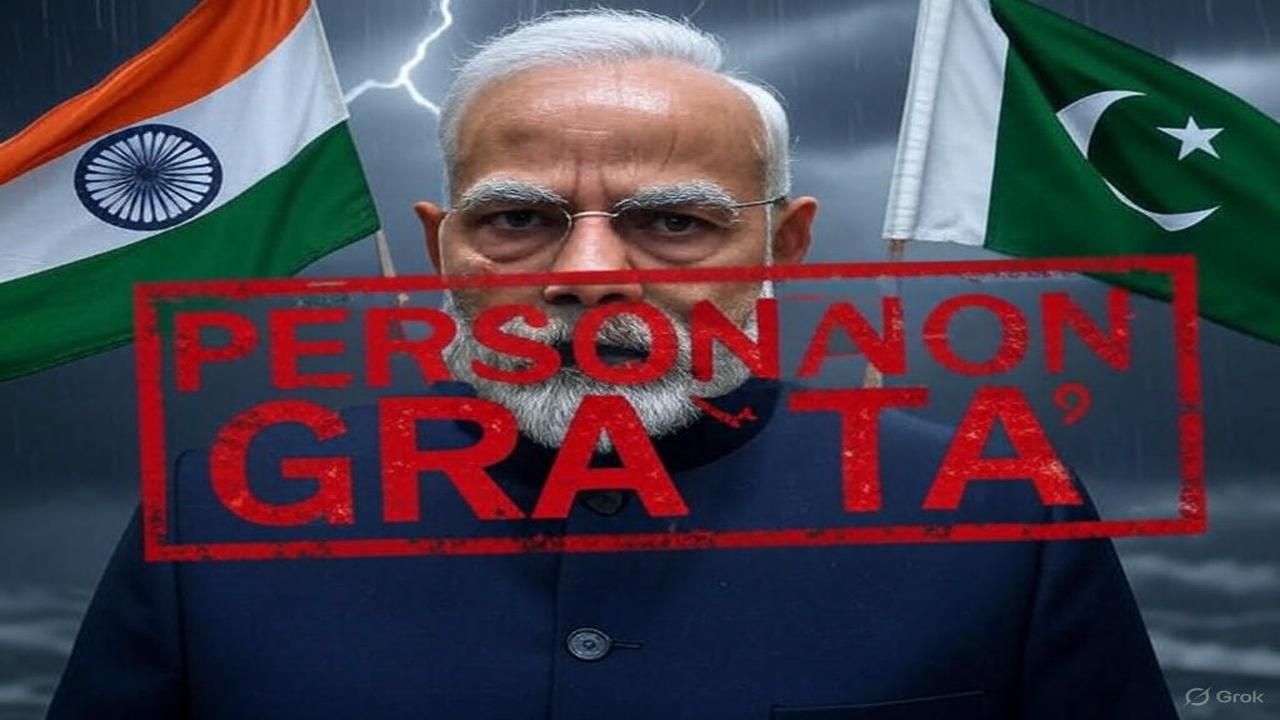“persona non grata,” meaning “not welcome, in this particular case,” has become a frequently used expression in recent times due to escalating tensions between India and Pakistan. On May 14, 2025, Pakistan demanded that an Indian diplomat resign within 24 hours, using the name persona non grata. India’s response to this action was akin to that of the United States, emphasizing the tension between the two nations. The latest updates will clarify the meaning of persona non grata, why it is happening, and what it means for India and Pakistan in simple terms.

What Does Persona Non Grata Mean?
In simple terms, persona non grata is when a country says a foreign diplomat is not welcome anymore, often because they did something wrong, like spying or breaking rules. This idea comes from a global agreement called the Vienna Convention on Diplomatic Relations (1961), specifically Article 9. This rule lets a country ask a diplomat to leave within a short time, usually 24 to 72 hours. Diplomats normally have special protection called diplomatic immunity, so they can’t be arrested, but a country can still kick them out if they cause trouble. Calling someone persona non grata is a big deal in diplomacy. It shows that two countries don’t trust each other, and it often leads to both sides kicking out diplomats in return, just like India and Pakistan are doing now.
The India-Pakistan Conflict in 2025
How It Started
The disputes over land, such as the Kashmir area, and accusations of Pakistan’s support of terrorism have caused India and Pakistan to have a difficult time getting along. India’s decision to expel Pakistan’ military personnel from New Delhi in April 2025, citing spying and breaching diplomatic conventions, only made things worse. On X, users like @visegrad24 and @sidhant mentioned India’s significant security measures in Jammu and Kashmir and accused Pakistan of contributing to the conflict.
Pakistan didn’t stay quiet. X messages posted by @KazmiWains and @tequieremos prompt a response from Islamabad defense, naval/air staff to demand their departure by April 30, 2025. A back-and-forth exchange that resulted in an Indian diplomat being sent away by Pakistan only 24 hours before the incident on May 13, 2025.
What Happened in May 2025
Pakistan’s government issued an official statement stating that the Indian diplomat violated diplomatic regulations of the Vienna Convention. On May 13, 2025, the Ministry of External Affairs (@MEAIndia on X) in India made an announcement that they had expelled a Pakistani official, and this followed shortly after. Both nations have subsequently reduced their diplomatic forces.’… India recalled its military personnel from Islamabad, and Pakistan downsized its team in New Delhi by 30 people by May 1, 2025, as reported by @journomitalli1 on X. It’s a grave matter that the Indian diplomat had to depart within 24 hours. Normally, countries extend their notification, but the short deadline makes the situation extremely delicate at this moment.
Past Examples of Persona Non Grata
This isn’t the first time countries have used persona non grata to deal with problems:
- Cold War Days: The U.S. and Soviet Union often kicked out each other’s diplomats for spying, and it always led to both sides doing the same in return.
- India-Pakistan History: Back in 2016, Pakistan sent an Indian diplomat named Surjeet Singh home for spying, and India did the same to a Pakistani diplomat. It happened again in 2020, as The Hindu reported.
- Around the World: In 2022, Russia sent away many Western diplomats during the Ukraine war. In 2023, Canada and India had a similar issue over claims that Indian diplomats were involved in actions against Sikh groups.
These examples show that persona non grata is often used when countries are already upset with each other, and spying claims are an easy reason to act.
What This Means for 2025
1. India and Pakistan Relations
This back-and-forth has made things worse between India and Pakistan. With fewer diplomats, it’s harder for them to talk and solve problems. Experts worry that if this keeps up, it could lead to bigger conflicts, maybe even involving their military, since both countries have nuclear weapons.
2. Peace in the Region
The whole South Asia region could be affected. India’s security moves in Jammu and Kashmir, mentioned on X, show they’re taking a strong stand against what they see as Pakistan’s interference. Pakistan’s quick responses show they’re not backing down either. Without secret talks to calm things down, the situation could get worse.
3. Global Diplomacy
This situation shows how fragile diplomatic rules can be. The Vienna Convention protects diplomats, but it also lets countries send them away easily, which can start a cycle of revenge. Other countries might rethink how they work with India and Pakistan, worried that this conflict could affect them too.
4. What People Think
On X, people from India, like @MattooShashank, are calling Pakistani diplomats a threat, while Pakistani users say India is the one causing problems. These strong opinions make it harder for leaders to find peace, as both sides feel pressured to act tough.
Why Spying Claims Matter
Both countries have accused their diplomats of spying, making persona non grata a common excuse. Pakistan accused the Indian diplomat of violating diplomatic rules, while The Times of India claimed that the Pakistani diplomat was a part of ‘a spy network’. Spying details is typically kept concealed, but these claims provide both countries with a defense to justify their actions to their citizens. How can this be achieved?
How to Fix This Problem
To calm things down, India and Pakistan could try these steps:
- Secret Talks: Using neutral people to talk behind the scenes could help both sides without losing face.
- Small Steps Forward: Bringing back full diplomatic teams and restarting trade or cultural programs could build trust.
- Outside Help: Groups like the United Nations could help them talk, but both countries often don’t want others involved.
- Calmer Words: Less angry talk on X and in the news could help reduce pressure to keep fighting.
Still, it’s hard to make progress because both countries don’t trust each other, and their people expect them to stay strong.
Conclusion
Pakistan’s decision to appoint an Indian diplomat as persona non grata on May 14, 2025, is indicative of growing tension between the two nations. Despite the Vienna Convention, countries are permitted to do so, and it can worsen current conflicts with India and Pakistan. The current focus is on preventing the conflict from spreading, but without discussions, the situation could become more intense. We need to remember that diplomacy is crucial for sustaining peace.
Don’t forget to read our other post here
Sources
Livemint – Pakistan declares Indian diplomat persona non grata
Times of India – Pakistan expels Indian official
Reuters – Pakistan affirms commitment to truce with India
Navbharat Times – Meaning of ‘Persona Non Grata’
Hindustan Times – Why India, Pakistan diplomats asked to leave
Indian Express – India expels Pakistani diplomat
Business Today – India declares Pakistani official persona non grata
Onmanorama – Pakistan declares Indian diplomat persona non grata

